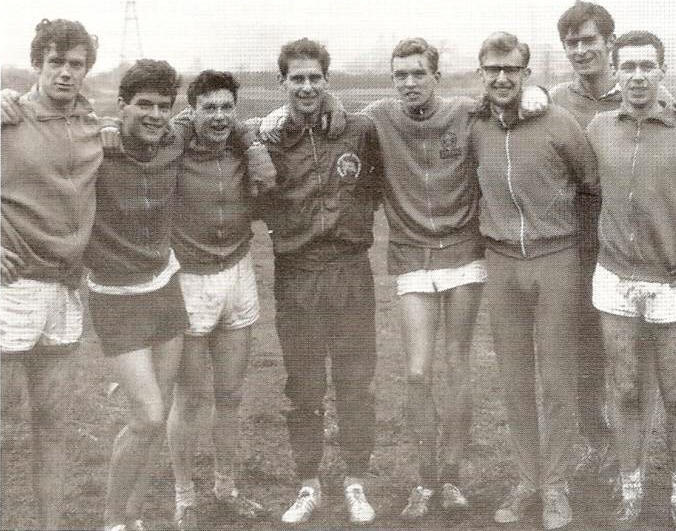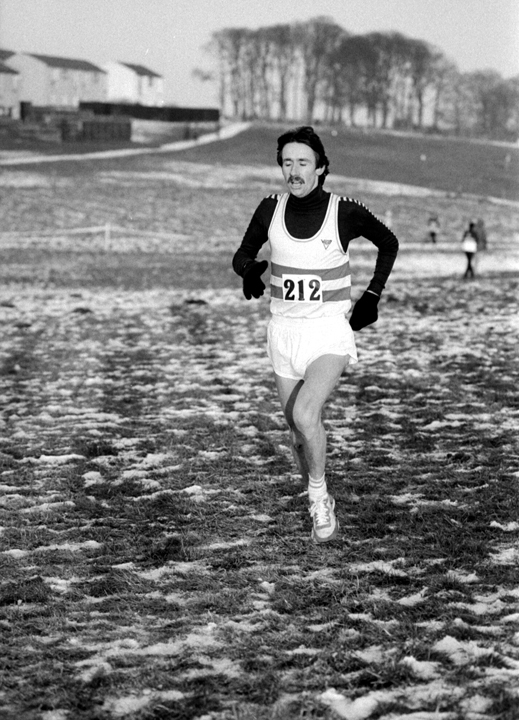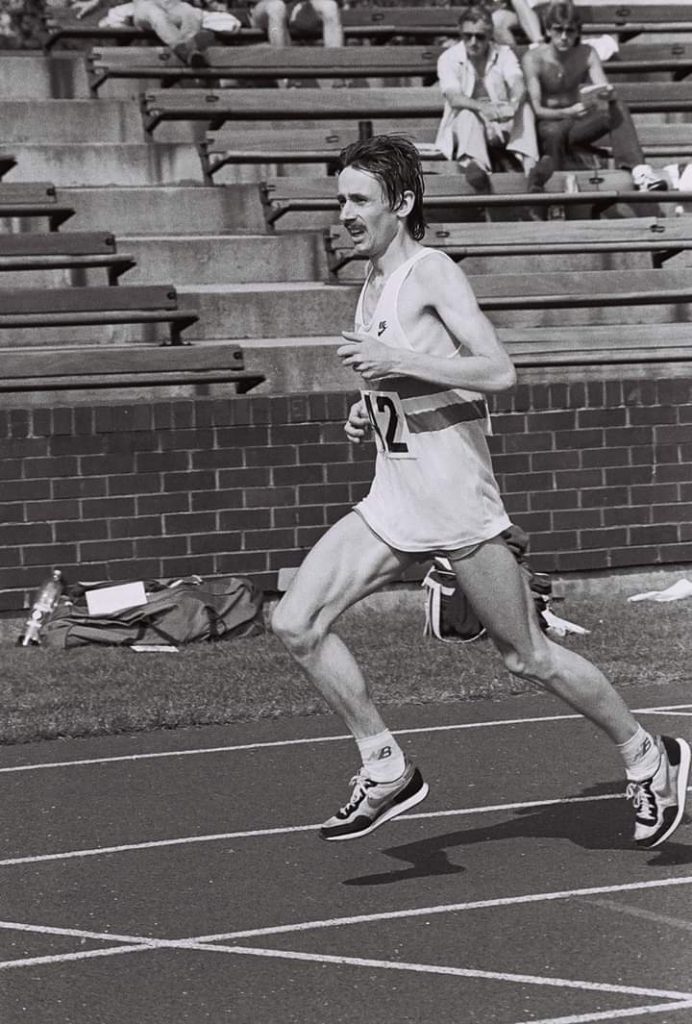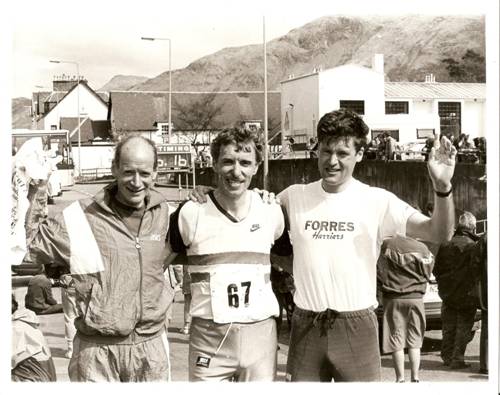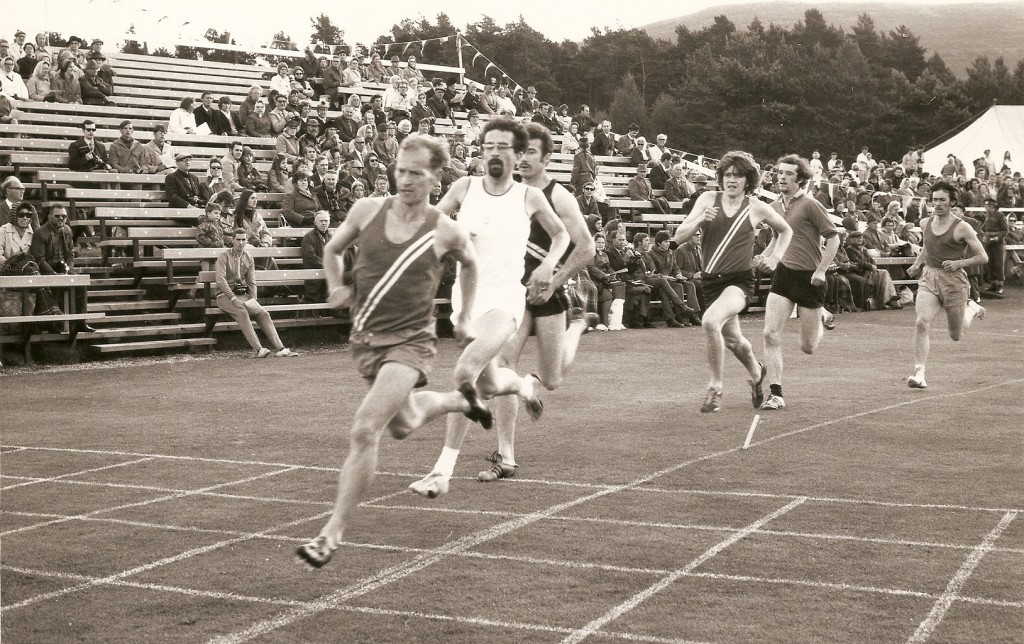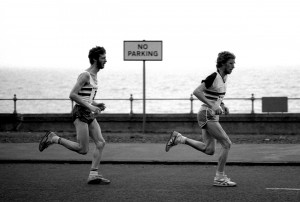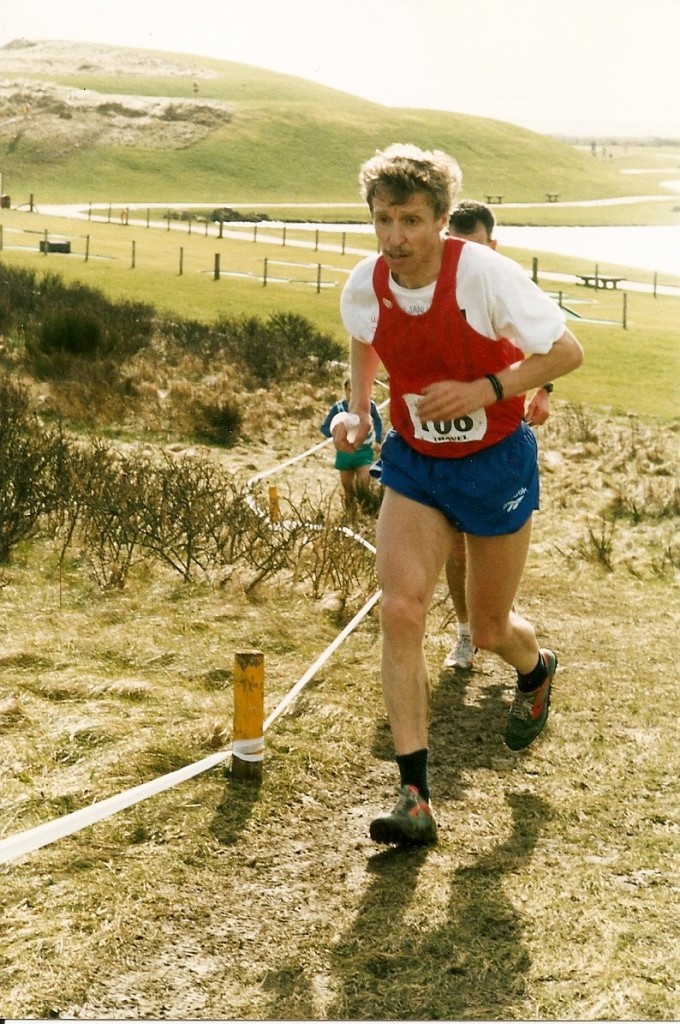
Colin winning the BVAF M45 Cross Country Championships at Irvine in March 1995
The running career of Colin Youngson exemplifies the golden age of Scottish road running like no other. Mainly in the 70’s and 80’s it just about made it to the 1990’s. The work of Dunky Wright and Jimmy Scott in the Scottish Marathon Club had got the SAAA Marathon championship firmly installed on the big stage of the national championships, and the growing and thriving road running scene made for the best road relay of them all, the eight-stage Edinburgh to Glasgow. Every road runner of note took part in them both but Colin revelled in them. Ten medals in the Scottish marathon championship along with 7 golds in thirty appearances in the E-G. Quite remarkable. Like many other Scottish road runners, Colin joined the Road Runners Club. Joining in 1968 he is still a member which in itself is testament to how much he loves the sport: he has written an article for their magazine and it was published in early 2016 under the title ‘What Did The RRC Ever Do For The Scots?’.
We could start his profile by looking at his replies to the questionnaire.
NAME: Colin James Youngson
CLUBS: Aberdeen University, Aberdeen AAC, Victoria Park AAC, Fredrickshof IF, Edinburgh Southern Harriers, Aberdeen AAC again, Metro Aberdeen AC, Forres Harriers
DATE OF BIRTH: 27 October 1947
OCCUPATION: Retired Teacher of English.
HOW DID YOU GET INVOLVED IN THE SPORT? Although I was a poor sprinter at Primary School, I was aware that I had some stamina, and knew that my father had been a miler. At 15 I ran just over 5 minutes for the mile in the Aberdeen Grammar School Sports, then won the mile in S5 and S6 with a best time of 4:35. I was ninth in the Scottish Schools cross-country (well behind the winner, my very good friend Innis Mitchell and fourth in the Mile. At Aberdeen Uni I improved gradually, especially once Donald Ritchie (the future ultra star) arrived. He usually beat me on the country but I was better on the road. We both aspired to finish less far behind the brilliant runners from Edinburgh University.
HAS ANY INDIVIDUAL OR GROUP HAD A MARKED INFLUENCE ON YOUR ATTITUDE OR INDIVIDUAL PERFORMANCE?
I was one of dozens of good Aberdeen runners who were inspired by the sarcastic, irascible but charismatic marathon runner Alastair Wood. Sunday runs were merciless and challenging. Ally and Steve Taylor were still very hard to beat when they were veterans! Once I started teaching in 1971, the talented tough guys of Vicky Park (including Pat Maclagan and Alastair Johnston) helped me to train harder and make progress. By the time I went to Sweden for ten months (1973-74) I was capable of training consistently well on my own. I reached my peak after I moved to Edinburgh (1974-81), and settled to 80 miles per week, including a long Sunday run and two repetition sessions with a number of very fit guys like Martin Craven, Sandy Keith, Fergus Murray, Alistair Blamire and (for a while, before he got far too fast) Allister Hutton. Then after I returned to Aberdeen we had a very good group, led by Fraser Clyne and Graham Laing. Metro Aberdeen was a particularly sociable club and the midweek ten mile runs were always competitive. Now I have retired, I am no longer capable of training with others without getting injured but Forres Harriers are very friendly and also successful (without my help). All my clubs have been excellent. Although this is certainly an individual sport, I always tried to be a reliable, consistent, valuable club runner, especially in road relays.
WHAT EXACTLY DID YOU GET OUT OF THE SPORT?
Self-respect. Opportunities to explore potential and achieve many targets. Daily outdoor exercise, fitness and health. Rivals who became friends. A lifelong interest in a great sport.
WHAT DO YOU CONSIDER TO BE YOUR BEST EVER PERFORMANCE OR PERFORMANCES?
1975: Scottish Marathon win in a championship record of 2.16.50; record on Stage 1 of the E to G.
1992: first Scot to win an individual category (M45) in the annual Veterans 5 Nations CC International (1992)
YOUR WORST?
Nothing too dreadful. Plenty of disappointing runs, inevitably. You learn to get over it and move on.
WHAT AMBITIONS DO YOU HAVE THAT WERE UNFULFILLED?
Never made the team for a major games, due to peaking in the wrong year, injury caused by over-training, the absence of physio support and lack of world-class physical talent. At my best, certainly worth a Commonwealth Games place, but never mind, since I enjoyed several successful international performances in different age-groups.
WHAT DID YOU DO AWAY FROM RUNNING TO RELAX?
Reading, writing, film, television, music, hill-walking, cycling, drinking good beer in great pubs all over Europe.
WHAT DID RUNNING BRING YOU THAT YOU WOULD NOT HAVE WANTED TO MISS?
A few days when it felt like I could run fast, almost for ever. The intensity of racing and hard training. Satisfaction from a good result (managing to give maximum effort). Running marathons in many countries. Winning international vests. The friendship of fellow runners.
CAN YOU GIVE SOME DETAILS OF YOUR TRAINING?
At university, 40 miles per week. At my peak, averaging 60 odd over the year but when building up to a marathon, six weeks of 80, including a weekly long run (16-25 miles), two or three rep sessions, plus recovery mileage, followed by two weeks tapering. As a younger veteran, 50-60, with the speedwork mainly fartlek. As an older veteran (age 60 plus), maybe 30-40 and only one run per day, from 3 miles to 10 miles in length. Nowadays a major aim is to get out every day but to avoid injury as much as possible.
If you have a look at Colin’s list of achievements on the Career Highlights page you will have an idea of what a marvellous career in the sport he has had/is having. From 800m to 10 Miles on the track, Cross Country on all sorts of surfaces, hill and point to point running (the Lairig Ghru) and maybe particularly the roads where he has excelled in short stage relays and on up to the 45 miles of the Edinburgh to Glasgow straight through. If they ever resurrect the Trans America Foot Race, don’t bet against him. The photograph above was taken at Irvine when he was winning the British Vets M45 Cross Country Championship in March 1995.
As I said above, Colin’s career exemplifies the zenith of Scottish road running like no other, with the possible exception of Donald Macgregor. The Scottish road running scene had been developed over the years since the war by Dunky Wright , Jimmy Scott and their committee members at the the Scottish Marathon Club to a point at which SAAA Marathon Championship had been given a place in the national track and field championships – road running’s highest trophy and it was held on the biggest stage in the land. The runners loved it. In addition the Edinburgh to Glasgow eight stage relay had been building since the days of the fifties when Bannon, Binnie and company plied their trade. Colin ran in 30 Edinburgh to Glasgow Relays and won no fewer than ten medals in the SAAA marathon championships, four of them gold. a total of 40 (FORTY!) run sub 2:30 and nine of those sub 2:20 is some record and one of which he can be justly very proud. He ran in all sorts of road races – the Edinburgh to Glasgow straight through for instance – and at venues all over Britain and the continent with a foray across the Atlantic. The details are at the link above to his career highlights. But should any sports historian be contemplating a review of the road running scene they should start with his career.
Have a look at this
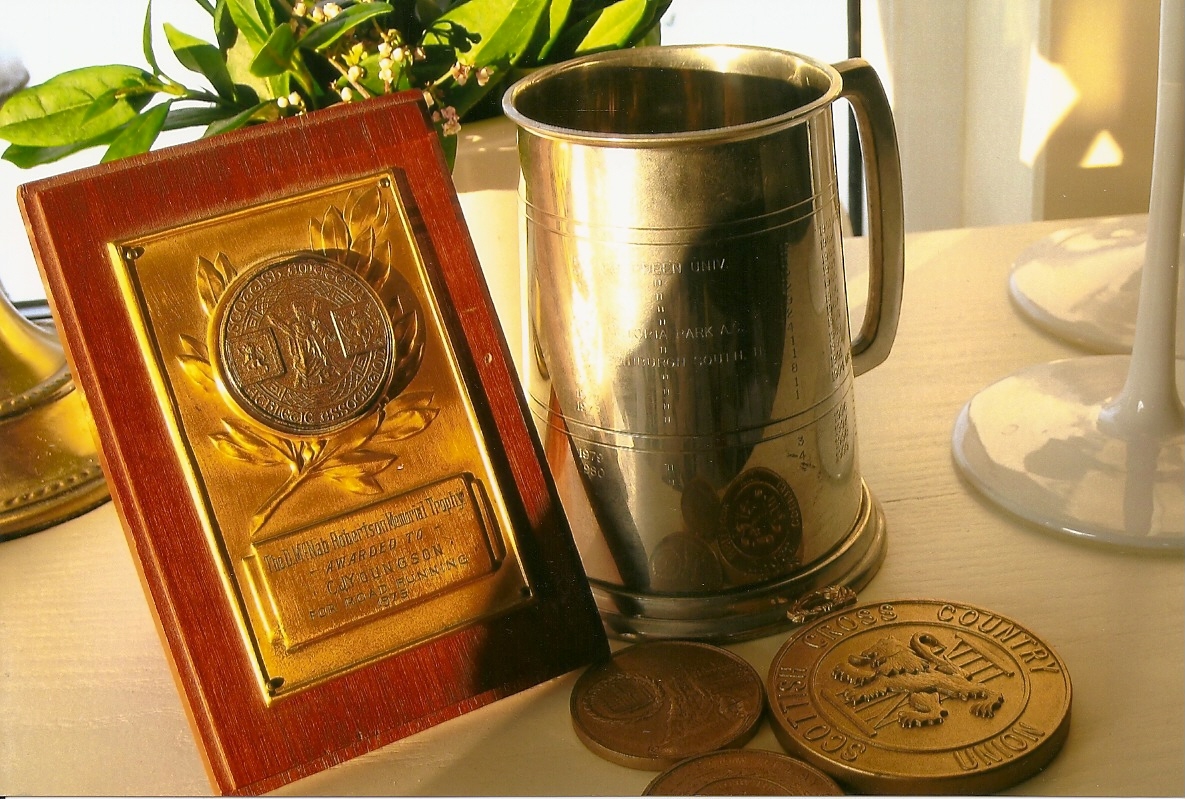
It is a picture of a successful and outstanding career in road running in the Edinburgh to Glasgow Relay and the marathon. The tankard was presented to him after he completed his thirtieth E-G and every race is listed on it, the medals are representative – they are all gold and in two different styles. If you would like his comments on his career in the Edinburgh to Glasgow Relay, go here . The smaller ones are the original type of medal which had a relief picture representing each of the two cities on it – the bigger and shinier one was the later version. The plaque is the Donald McNab Robertson Trophy when he was the Scottish Road Runner of the Year in 1975. If you want a closer look, click on the wee thumbnail at the bottom. The link to his E-G career is above and the marathon record for Scottish Championships only is below: if you want his complete marathon running record for over 50 races plus some ultras then go here.
| Year |
Place |
Time |
Year |
Place |
Time |
| 1972 |
3 |
2:26:45 |
1980 |
2 |
2:24:56 |
| 1973 |
|
2:24:01 |
1981 |
1 |
2:20:42 |
| 1974 |
3 |
2:21:36 |
1982 |
1 |
2:18:02 |
| 1975 |
1 |
2:16:50 |
1983 |
2 |
2:28:46 |
| 1977 |
|
2:19:35 |
1984 |
3 |
2:23:36 |
| 1978 |
|
2:46:00 |
1985 |
2 |
2:23:46 |
| 1979 |
3 |
2:19:48 |
1999 |
|
2:55:43 |
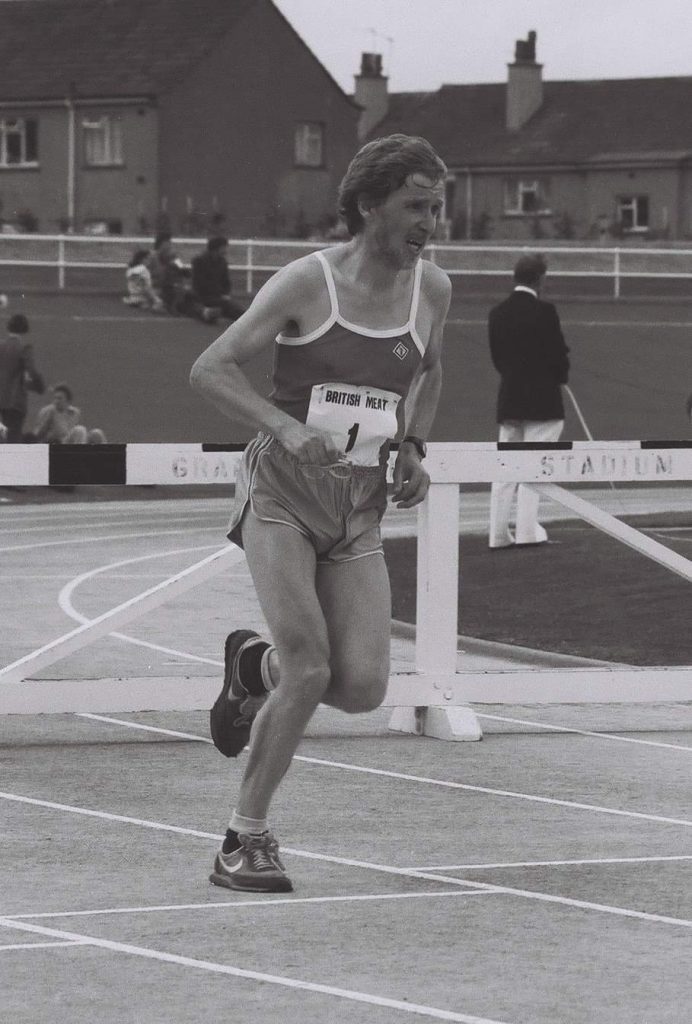
Colin about to win the 1982 Scottish Marathon at Grangemouth
There is a lot that can be picked up from accounts of Colin’s three victories in this race and these are described here:
“Sandy Keith was, in the mid-1970s, a major marathon rival and I trained with him on long runs near Edinburgh only when I felt good, since he was basically stronger than me. I defeated him three times in the Scottish Marathon – in 1974, 1975 and 1982. However, he beat me in 1977 and was the superior marathon runner from 1976 to 1979.
My training at this time included three key weekly sessions. Monday meant The Meadows: four laps including no less than sixteen repetitions – short or long, on the flat, uphill or downhill on tarmac paths. Wednesday was a nine-mile pavement fartlek through Colinton with a series of testing longer efforts. Saturday was race day in the 1970s but, no matter what state you were in, the Sunday run was compulsory – a basic sixteen miles from The Meadows through Colinton Dell and out the old railway line to Balerno (and then back). The route might be extended via the reservoirs and Bonaly Tower. Anything between 16 and 25 miles might be covered (the latter with a sadistic little final lap of The Meadows, pretending not to be exhausted, until you parted from your companions/rivals with a cheery wave, turned a corner, and struggled wearily home. If you added some recovery running or a few hill reps on the intervening days, you had about eighty miles of excellent training in the hilly city – worth a hundred in the flat south?
Saturday 28th June 1975, Meadowbank Stadium, Edinburgh.
It was a warm, sunny day, and Sandy Keith took the initiative from the start, racing away down the hill to Portobello into a slight headwind. Only Colin tucked in behind and tried to relax. It seemed a hard way to start 26 miles! Sandy’s ambition was to win a marathon from start to finish, from the front – and how he tried! Five miles in 25.30, ten in 51.30, the turn in 67.30. As the pair, on their return journey, passed ex-champions Alastair Wood and Donald Macgregor, who were approaching the turning point, Wood muttered that the young fools would destroy each other. Macgregor warned that they were about two minutes ahead already!
Since there was now a pleasant following breeze, and to show that he was feeling good in spite of Sandy’s efforts, Colin moved alongside and they ran together for the next five miles. Then, at nineteen, as the route swung into a lay-by for a drink station, an official was clumsy in handing up Sandy’s cup of water. Sandy swore, quite uncharacteristically, hesitated for the drink, and Colin, seeing that his rival was feeling the strain, simply surged away for a full mile, down the Wallyford hill. 20 miles in 1.43.45. A nervy glance back revealed a decent gap, fifteen seconds, and it was head down again and flat out for Musselburgh and Portobello. The pace was still fast, but tiredness and worry set in. To win the Scottish Marathon was Colin’s main ambition in the sport, and now it was a case of hanging on grimly. Up the long hill to Jock’s Lodge and then, at the twenty-five mile mark, Youngson’s right leg suffered cramp. Would Keith catch up, so near to the finish? Keeping the limb as straight as possible, Youngson bashed onwards, to the stadium and round the track. No sign of Sandy until the final bend was reached and it was safe to negotiate the straight and break the tape.
What a relief for Colin Youngson, who felt sure that he must have broken the 2.20 barrier at last, but was very surprised to find that Jim Alder’s championship record had been broken by 21 seconds. Finishing times were: Colin Youngson (Edinburgh Southern Harriers 2.16.50; Sandy Keith (Edinburgh Athletic Club) 2.17.58; Alastair Wood (Aberdeen AAC) 2.21.14; Davie Wyper (West of Scotland) 2.25.44; Gordon Eadie (Cambuslang) 2.25.48; Alistair Blamire (ESH) 2.26.20; Ian Trapp (EAC) 2.28.26; Mike Logue (Victoria Park AAC) 2.29.56.
After the race, Alastair Wood said, “Well done, Colin. I think you’re at your peak now.” To which Colin replied that he felt there was a little more to come. But in fact Alastair did turn out to be right since this remained Colin’s fastest time ever. Still, the rest of the season produced further success: second to Allister Hutton (1990 London Marathon winner) in the 10,000 metres track race for Scotland against Iceland in Reykjavik; second behind ‘ultra’ great Cavin Woodward in a fast ‘Two Bridges’ 36 miler; and a close second to Olympian Danny McDaid of Eire in the international marathon in Berchem, Antwerp. This was Colin’s only race representing Great Britain, and he and Max Coleby won the team race. At the end of the 1975 season Colin Youngson was presented with the Scottish Amateur Athletics Association ‘Donald McNab Robertson Memorial Trophy’ as Scottish Road Runner of the year.
Saturday 20th June 1981, Meadowbank Stadium, Edinburgh.
The course was completely new, and not as fast as the ‘Commonwealth Games’ one. The route was London Road, Seafield Road East, Seafield Road, Lower Granton Road; two loops round West Harbour Road, Cramond Esplanade, turn left at the Cramond Hotel, Glebe Road, Lauriston Farm Road, West Granton Road; and then right for Granton, Seafield Road, turn right up Craigentinny Avenue, and right again for the stadium.
Colin Youngson, who had moved north to teach in Kemnay, Aberdeenshire, and had changed clubs from ESH to Aberdeen AAC, was fit and confident. On a warm, sunny day, he started fast and led a group of eight down the hill towards Portobello and then left towards Granton. After a little hesitation, he surged at five miles (25.17) and the group broke up, with Donald Macgregor (Fife AC), Doug Gunstone and former champion Alastair Macfarlane (both Springburn Harriers) chasing hard. Olympian Donald Macgregor was by now SAAA event coach for the marathon, but it is not true that he shouted advice to everyone within earshot – e.g. “Slow down!”
The lead was slender, only six seconds between Youngson (50.42) and Gunstone, who was running with Macgregor at ten miles. By halfway (68.36) it was eleven seconds; and by fifteen (77.06) 16 seconds, with Macfarlane another twelve seconds down, and gaining.
The twenty-mile point was reached in 1.44.40 by Colin Youngson, who was really feeling the mental strain of leading by so little for so long. By then the gap was up to 34 seconds – not at all a comfortable lead. So Youngson put his head down and ran flat out for three miles, to stretch away from Macgregor and Macfarlane, who had moved into third place. Colin was about a minute ahead with a couple of miles to go, but slowed down on purpose while plodding up the steep hill of Craigentinny Avenue, so that he could gain some physical and mental resilience to fight, if Donald’s famed strong finish proved a threat. At 25 miles (2.12.58) the time gap was 54 seconds.
Eventually it was a relieved but exultant Colin Youngson who hung on to win in 2.20.42 from Donald Macgregor (2.21.31); Alastair Macfarlane (2.22.25); Doug Gunstone (2.26.52); Evan Cameron (ESH 2.27.23); Tommy Wiseman (Victoria Park 2.27.57); Dave Lang (Elgin AAC 2.28.28); and Donald Markie (Falkirk Victoria Harriers 2.29.32).
Doug Gillon, in the Sunday Standard, described the three medallists as ‘ageing but speedy war-horses, mounting the rostrum’. (Colin was 33, Donald 41 and Alastair 35).
Saturday 10th July 1982, Grangemouth Stadium
This took place on an out and back course from Grangemouth Stadium. A calibrated wheel was used to ensure that the correct distance was run. Only thirty competitors turned up, but they included a number of good athletes. Conditions were warm and humid.
Colin Youngson of Aberdeen AAC had been running fast in training, including six or ten mile time-trials in his 80 miles per week. He had reduced this to 50 two weeks before the race, and had then experimented, running a fairly hard 21 on the Sunday, followed by the protein ‘diet’, a ten mile run at 7 a.m. on Monday and a carbohydrate-packed breakfast. Thus the tough part of the regime had lasted only 20 hours! No running on Tuesday and Wednesday, a three mile ‘digestive’ jog/stride on Thursday and Friday, and off to the start.
In the dressing room he encountered Jim Brown (Scottish 10,000m record holder and GB International), who declared his intention of running two hours twelve minutes! Colin had great respect for his younger rival, who had defeated him easily on countless occasions over the country and in shorter road and track fixtures. It was agreed that they would share a sensibly brisk pace to ten miles, in under 52 minutes. Then Jim would make his bid. Colin started quite fast, and led for two miles. Thereafter they went to the front for one mile each, into the breeze. Five miles passed in 26.27, which seemed wrong – rather slow for the pace they seemed to be setting. At this point Sandy Keith completed the trio. By ten miles, on target 51.49, the watch indicated a speed-up but the tempo had in fact remained much the same, although Sandy had slipped back to 53.00 and was running with Craig Ross, a 2.21 man.
For the next three miles to the turn, Youngson simply sheltered behind Brown and waited for him to surge away. Nothing happened. Half-way was reached in 67.21; with Ross in 69.10; Keith 69.32; Peter Wilson and Gerry Fairley (Kilbarchan) 71.40. At the front, nothing continued to happen, and the breeze was now helping progress. Fifteen miles (78.11) saw the duo 2.16 in front of Ross.
Gaining in confidence due to the steady, fairly comfortable pace, and feeling that, although it was hard to imagine Jim Brown beatable, he ought to be tested, at least, Colin Youngson prepared to try. As his stopwatch reached 1.30, he moved to the middle of the road and ran absolutely flat out for the next half mile. A look behind revealed a fifty-yard gap! Another hard half mile – and there was no one in sight! Jim Brown, perhaps feeling that his target time was unattainable, had dropped out.
An unsympathetic but delighted Youngson later wrote in his diary “Bashed on slightly less hard”. 20 miles took 1.45.14; Ross 1.50.24; Keith 1.50.38; Wilson 1.51.56; John Lamont (Aberdeen AAC) 1.52.47. Craig Ross had to stop shortly afterwards. The last two miles felt tough to Youngson, since he was striving to beat 2.20 and could see neither the stadium nor a race steward to point the way. However, both appeared, and as Colin panted up to the entrance, there was previous winner Jim Dingwall leaning against the wall. Jim glanced at a stopwatch and said, “Still only 2.16 – should get a decent time if you hurry.” So there was no steady lap of the track, waving modestly – just a red-faced maximum effort which resulted in a narrow failure to break 2.18. Still, it was Colin Youngson’s third-fastest time (2.18.02), and one of the bigger winning margins. Second was Sandy Keith (EAC 2.26.34); third Peter Wilson (Aberdeen AAC 2.27.01); fourth John Lamont (Aberdeen AAC 2.28.59); and fifth Andy Stirling (Bo’ness 2.30.17). Another good Aberdeen performance – even Sandy Keith used to be a club member.”
Looking for a review of his career I came up with this article by David Carter in the ‘Scotland’s Runner magazine which is sadly now defunct. The article covers his career up to the point where he became a veteran and provides a good starting point. It is worth pointing out right at the start however that although known mainly as a road runner, there is much more to Colin Youngson than that – see the photograph above for a start! Let’s just list his honours, as far as I know them that is. The gold medal haul is very impressive:
| Individual/Team |
Event |
Total |
| Individual |
SAAA Marathon |
3 |
| |
SAAA 10 Miles Track |
1 |
| Team |
National Cross Country |
2 |
| |
Cross Country Relay |
1 |
| |
Six Stage Relay |
3 |
| |
Edinburgh to Glasgow |
7 |
| |
TOTAL |
18 |
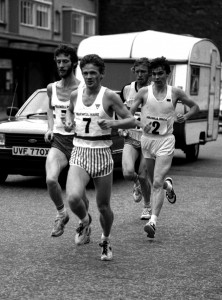
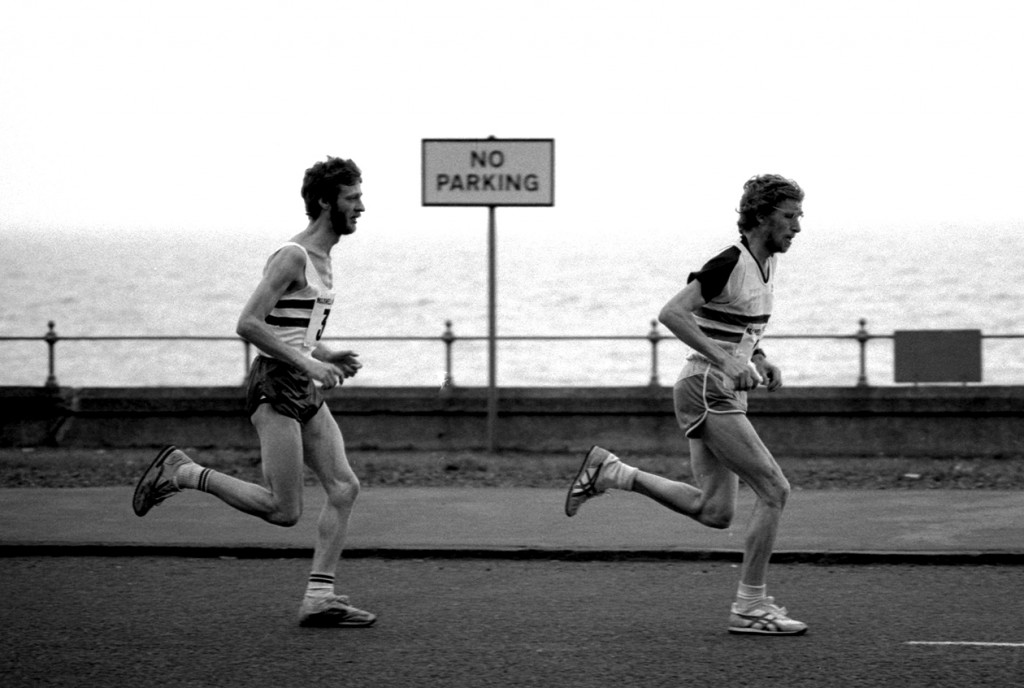
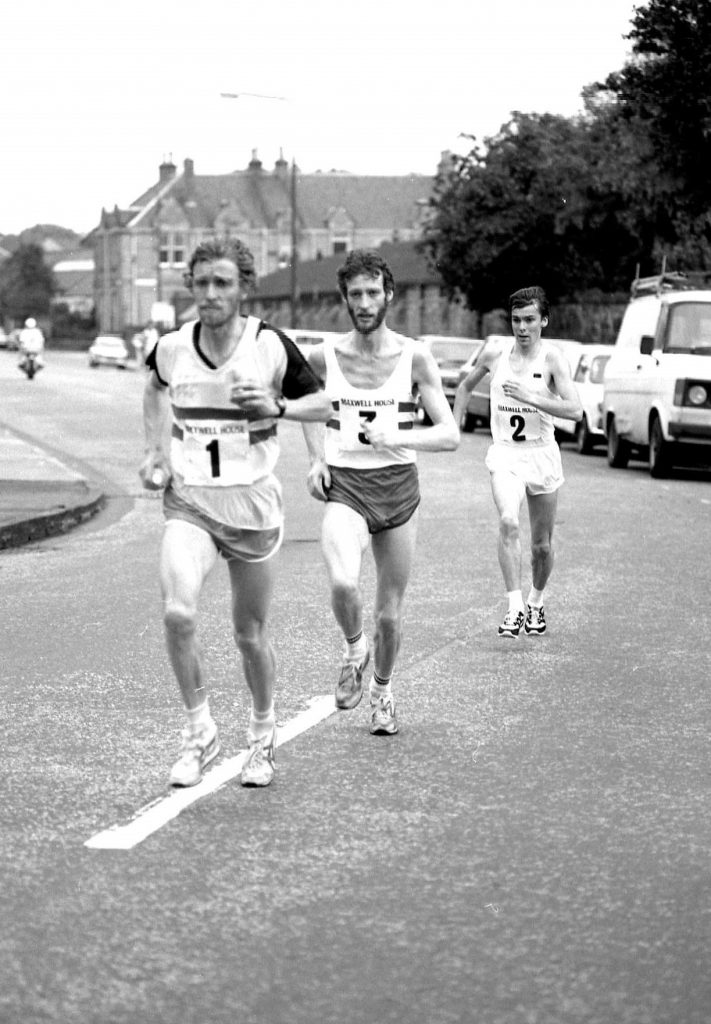
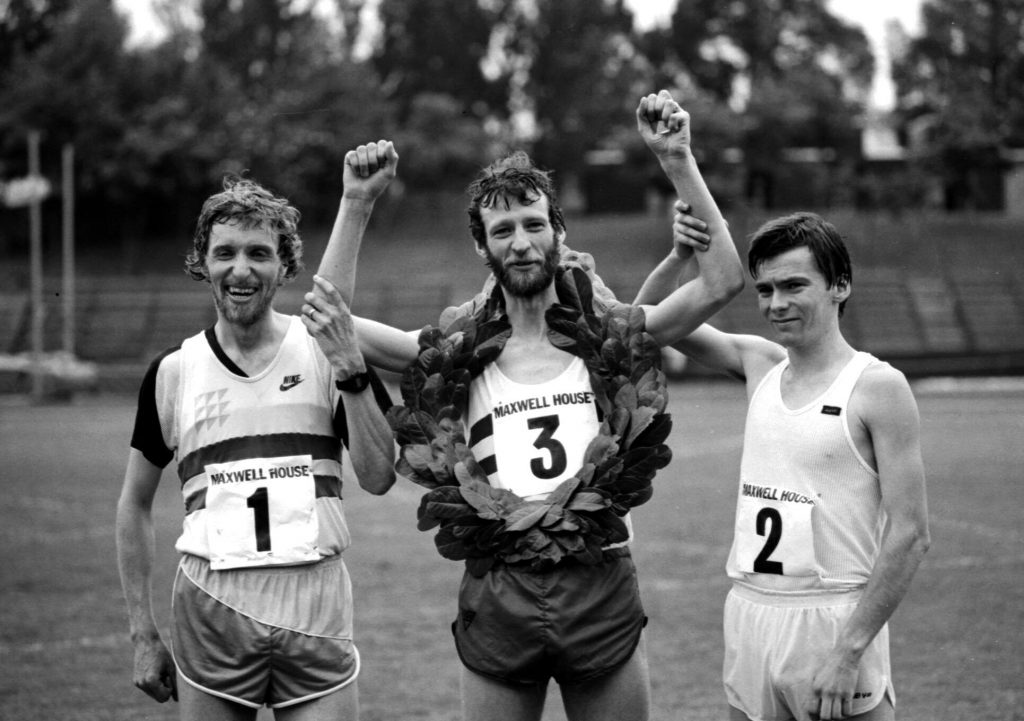
From the SAAA Marathon, 1985
Representative Vests
(NB: Senior Scottish appearances between ages of 27 and 40. Scottish Masters in every five year age group from M40 to M70 (15 representative races to 2017). 1965 to 2020, 56 successive seasons (in seven different decades) completing at least one ‘Scottish Championship’ of some variety – Indoor or Outdoor Track, Cross-Country or Road.)
| Representing |
Event |
Number |
| Scottish Universities |
1 Mile Track |
1 |
| Scottish Universities |
Cross-Country |
6 |
| Scotland Track |
10,000m v Iceland 1975 (Team win) |
1 |
| SCCU |
|
3 (1971-73) |
| Scotland First Team |
Gateshead XC International 1975 |
1 |
| Scotland |
Marathon (1979-1990) |
11 (3 team wins) |
| GB Two Man Team |
Antwerp International Marathon 1975 |
1 (Team Gold) |
| Scottish Masters |
Annual Five Nations Cross-Country 1990-2017 |
15 |
| GB Masters |
European Masters 25K |
1 (Team Silver) |
| GB Masters |
World Masters cross-country M50 |
1 (Team Gold) |
Now for the promised article from ‘Scotland’s Runner’
YOUNGSON NOW ELIGIBLE FOR THE VETERAN FRAY
David Carter profiles Colin Youngson who became eligible for veteran competition on his 40th birthday in October. Colin is also a talented fiction writer and from next month ‘Scotland’s Runner’ will be serialising two of his entertaining short stories.
Marathons are made of milestones and Colin Youngson has just passed two. This year’s Aberdeen Marathon was his 50th and in October he turned 40. The veteran world is going to notice the difference.
The record so far is impressive – and consistent. He has 10 medals from the SAAA Marathon between 1972 and 1985 (he missed 1976) – three gold, three silver and four bronze, including a championship record and a personal best in 1974 of 2:16:50. He has been an ever present in the Edinburgh – Glasgow Relay (apart from 1973 when he was in Sweden) with some memorable (winning) tussles over the last lap. He still holds the fastest time for the first leg which has stood since 1975.
——————————————————————
I liked adventure runs, crazy runs of you like, runs to prevent brain death”
___________________________________________
Another impressive thing about Colin Youngson’s record so far is its variety, particularly more recently, though he ran Ben Nevis as well as his first marathon as soon (aged 21) as the regulations allowed. He won the Lairig Ghru race last year and came sixth in this year’s Highland Cross. ‘I’ve always liked adventure runs, crazy runs if you like, runs to prevent brain death. Especially when you’re on the slide a bit you’ve got to find fun events, the unusual events, the challenge’ he explains. One event he recommends is the Two Bridges Race. ‘The scenery’s good, the event is well organised, and if one is used to running marathons it’s a delight to be able to do it all at training speed. What’s more everyone chats, and there are the beer prizes.’
In 1980 he ran the London to Brighton (54 miles), hitting the wall at 40 but still finishing respectably. ‘Interestingly,’ he says, ‘I recovered more quickly from that than many marathons. The marathon, at speed, is hard. It’s speed that does it. All those guys that do four hour marathons should forget it. They should do 10K’s and half marathons and then they could look at a marathon and do a half decent time.’ Yet marathons are clearly in Colin’s blood. I was interested in the remark that he ran his first marathon (2:41) at the age of 21. Why was that? Inevitably, for distance runners from the north east, the name that cropped up was that of Alastair Wood.
‘There was almost a school of distance running at the time around Aberdeen, mainly because of Steve Taylor and Alastair Wood. In other places in Scotland there was an exaggerated respect for the marathon – it was only for old men. But Wood gave us belief. He had done it. And we saw him training every Sunday. There was Abebe Bikila, a Japanese, someone else I can’t remember – and Wood. He called himself “The world’s fastest white man”.’
Was he a coach then? A mentor? A guru? ‘Not really. The attempt to gain his respect was the spur. He’s mellowed now but by God he was cantankerous then. Witty, satirical, challenging.
Colin’s best year in terms of performance was 1975, and 1976 his worst. Yet 1976 was undoubtedly of more lasting importance. In 1975 he was sixth in the British rankings for the marathon and an Olympic place in 1976 was not out of the question. Heavy training, however, produced some disappointing performances., and in 1976, sciatica. ‘I realised,’ says Colin, ‘that my body just wasn’t built for 100 a week mileage.’
_____________________________________________
If things are getting really crazy in the marathon I’ll just step off the track.
_____________________________________________
It was a good lesson learned and since then he has settled into a basic 60 miles a week (with increases for particular marathons) with maybe six serious races a year. It means that he is more or less as fit, fresh and resilient as he was at 21.
His first race as a vet will,he hopes, be the Scottish Vets Cross Country in January. The Boston Marathon in April is the next possibility. He realises that an invitation is unlikely but the prospect of a $5000 prize for first vet is tempting. ‘I’ve got to be pretty fit,’ he says, ‘to put my own money down on that one.’ Then there’s the British vets, European vets and many more. Will he approach races differently?
‘Yes. I feel that I want to do more distances. Maybe 1500 metres for example. And if things are getting really crazy in a marathon I’ll just step off the road. I’ve never dropped out before though I can think of one or two occasions when I probably should have. There was the Athens Marathon for example in 1976. I was running a temperature beforehand and coughing badly. There was a medical examination before the race and I filled myself full of cough sweets. I passed the test but coughed all the way back to the hotel. It was blistering hot and I did a personal worst, 2:48. I really shouldn’t have run. On the other hand of my 50 marathons nine have been sub 2:20. It would be pleasant to go below 2:20 as a vet ……’
Somehow, dropping out is something I can’t see Colin Youngson doing. I asked him to describe his running style. ‘Heavy footed’, he said, ‘hardly elegant – determined.’
He has himself pretty well summed up there. And when you add to that determination his experience and his competitiveness, you have a formidable runner. Colin Youngson has a promising future.
Colin’s Dad was a runner and a source of great inspiration to him. Colin did what all of us should do and researched for himself his Dad’s sporting history. It is a warm-hearted and also inspiring story and can be reached from here The trophies in the picture are also part of the testament. But, to conclude, if we turn the focus back on Colin we should point out that he has since that article all those years ago had a lot of success as a veteran athlete too: he was won many Scottish Masters Medals and – for now – six British Masters titles at distances between 3000m and the marathon! And he’s not finished yet ……….
Colin Youngson – Marathon Career Record
| No |
Date |
Venue |
Position |
Time |
Winner (Club) Time |
| 1 |
12 July 1969 |
Inverness – Forres |
3 |
2:41:13 |
Alastair Wood (Aberdeen) 2:27:44 |
| 2 |
24 October 1970 |
Harlow |
24 |
2:34:49 |
Alastair Wood (Aberdden) 2:17:59 |
| 3 |
24 June 1972 |
Edinburgh (SAAA) |
3 |
2:26:45 |
Alastair Wood (Aberdeen) 2:21:02 |
| 4 |
25 July 1972 |
Helsinki |
6 |
2:32:18 |
Reino Paukkonen (Fin) 2:18:49 |
| 5 |
23 June 1973 |
Edinburgh (SAAA) |
5 |
2:24:01 |
Don MacGregor (Edinburgh S) 2:17:50 |
| 6 |
27 October 1973 |
Haverodal (SWE) |
1 |
2:22:28 |
|
| 7 |
25 November 1973 |
Sodertalje (SWE) |
1 |
2:26:07 |
|
| 8 |
22 June 1974 |
Edinburgh (SAAA) |
3 |
2:21:36 |
Don MacGregor (Edinburgh S) 2:18:08 |
| 9 |
06 July 1974 |
Inverness – Forres |
2 |
2:33:44 |
Sandy Keith (Edinburgh) 2:26:28 |
| 10 |
26 October 1974 |
Harlow |
8 |
2:21:06 |
Jim Wight (Edinburgh) 2:16:28 |
| 11 |
28 June 1975 |
Edinburgh (SAAA) |
1 |
2:16:50 |
Championship record |
| 12 |
13 September 1975 |
Berchem (BEL) *** |
2 |
2:21:09 |
Danny McDaid (Ire) 2:20:51 |
| 13 |
06 April 1976 |
Marathon – Athens |
6 |
2:46 |
Mircea Damian (Rom) 2:27:33 |
| 14 |
08 May 1976 |
Rotherham (AAA) |
40 |
2:27:56 |
Barry Watson (Cambridge) 2:15:08 |
| 15 |
25 June 1977 |
Edinburgh (SAAA) |
4 |
2:19:35 |
Jim Dingwall (Falkirk) 2:16:05 |
| 16 |
27 August 1977 |
Enschede (NED) |
35 |
2:32:57 |
Brian Maxwell (Can) 2:15:14 |
| 17 |
07 May 1978 |
Sandbach |
43 |
2:23:07 |
Tony Simmons (Luton) 2:12:33 |
| 18 |
03 June 1978 |
Edinburgh (SAAA) |
11 |
2:46:40 |
Ian MacIntosh (Ranelagh) 2:23:07 |
| 19 |
26 May 1979 |
Edinburgh (SAAA) |
3 |
2:19:48 |
Alastair MacFarlane (Springburn) 2:18:03 |
| 20 |
08 July 1979 |
Tullamore (IRE)* |
22 |
2:30:42 |
Pat Hooper (Ire) 2:17:46 |
| 21 |
16 September 1979 |
Aberdeen |
3 |
2:27:44 |
Graham Laing (Aberdeen) 2:21:40 |
| 22 |
12 April 1980 |
Maassluis (NED) |
2 |
2:21:29 |
Jorn Lauenborg (Den) 2:17:30 |
| 23 |
21 June 1980 |
Edinburgh (SAAA) |
2 |
2:24:56 |
Graham Laing (Aberdeen) 2:23:03 |
| 24 |
11 April 1981 |
Maassluis (NED) |
4 |
2:18:54 |
Cor Vriend (Ned) 2:17:06 |
| 25 |
20 June 1981 |
Edinburgh (SAAA) |
1 |
2:20:42 |
|
| 26 |
18 October 1981 |
Glasgow** |
4 |
2:19:12 |
Jim McGlynn (Ire) 2:18:24 |
| 27 |
03 May 1982 |
Belfast |
5 |
2:24:01 |
Greg Hannon (N Ire) 2:20:25 |
| 28 |
10 July 1982 |
Edinburgh (SAAA) |
1 |
2:18:02 |
|
| 29 |
19 September 1982 |
Aberdeen* |
4 |
2:21:03 |
Gerry Helme (Eng) 2:15:16 |
| 30 |
17 October 1982 |
Glasgow |
12 |
2:22:13 |
Glenn Forster (Eng) 2:17:16 |
| 31 |
02 April 1983 |
Maassluis (NED) |
6 |
2:17:33 |
Cor Vriend (Ned) 2:13:29 |
| 32 |
18 June 1983 |
Edinburgh (SAAA) |
2 |
2:28:46 |
Peter Wilson (Aberdeen) 2:26:20 |
| 33 |
11 September 1983 |
Glasgow** |
4 |
2:19:18 |
Peter Fleming (Bellahouston) 2:17:46 |
| 34 |
18 March 1984 |
Barcelona* |
28 |
2:26:04 |
Werner Meier (Sui) 2:14:50 |
| 35 |
28 April 1984 |
Albi (FRA) |
2 |
2:29:49 |
Raffaele diBenedetto (Ita) 2:27:04 |
| 36 |
16 September 1984 |
Aberdeen (SAAA)* |
6 |
2:23:36 |
Mark Burnhope (Eng) 2:19:36 |
| 37 |
13 April 1985 |
Maassluis (NED) |
12 |
2:19:22 |
John Boyes (Bournemouth) 2:13:20 |
| 38 |
23 June 1985 |
Edinburgh (SAAA) |
2 |
2:23:46 |
Evan Cameron (Edinburgh) 2.22.49 |
| 39 |
15 September 1985 |
Aberdeen* |
2 |
2:23:58 |
Dave Catlow (Eng) 2:22:54 |
| 40 |
27 April 1986 |
Dundee |
1 |
2:20:03 |
|
| 41 |
25 May 1986 |
Aberdeen* |
4 |
2:27:56 |
Ray Maule (Eng) 2:22:52 |
| 42 |
21 September 1986 |
Glasgow |
13 |
2:22:42 |
Kenny Stuart (Eng) 2:14:04 |
| 43 |
26 April 1987 |
Lochaber |
1 |
2:26:15 |
|
| 44 |
24 May 1987 |
Aberdeen |
2 |
2:29:21 |
Ian Corrin (Eng) 2:27:42 |
| 45 |
18 April 1988 |
Boston (USA) |
109 |
2:29:51 |
Ibrahim Hussein (Ken) 2:08:43 |
| 46 |
22 May 1988 |
Aberdeen** |
10 |
2:28:38 |
Hamilton Cox (Sco) 2:21:15 |
| 47 |
02 October 1988 |
Stone (Flying Fox) |
2 |
2:29:15 |
Eddy Lee (Pegaus) 2:23:15 |
| 48 |
23 April 1989 |
Lochaber |
1 |
2:29:40 |
|
| 49 |
28 May 1989 |
Aberdeen (SAAA)* |
7 |
2:31:23 |
Ian Bloomfield (Eng) 2:22:30 |
| 50 |
27 May 1990 |
Aberdeen* |
DNF |
|
Chris Tall (Eng) 2:23:32 |
| 51 |
26 April 1992 |
Lochaber |
1 |
2:36:23 |
|
| 52 |
18 April 1993 |
London (AAA) |
255 |
2:37:14 |
Eamonn Martin (Basildon) 2:10:50 |
| 53 |
03 October 1993 |
Stone (Flying Fox) |
4 |
2:36:18 |
Kevin Wilkinson (San Domenico) 2:28:37 |
| 54 |
17 April 1994 |
London (AAA) |
350 |
2:39:10 |
Dionicio Ceron (Mex) 2:08:53 |
| 55 |
02 April 1995 |
London (AAA) |
695 |
2:49:40 |
Dionicio Ceron (Mex) 2:08:30 |
| 56 |
26 September 1999 |
Edinburgh (SAAA) |
138 |
2:55:43 |
Andres Espinosa (Mex) 2:14:31 |
Asterisk * = Scottish International
** = Scottish International team win
*** = British International team win
Colin Youngson – Ultra Career Record
| No |
Date |
Venue |
Pos |
Time |
Winner (Club) Time |
| 1 |
23 August 1975 |
Two Bridges 36.2m |
2 |
3:29:44 |
Cavin Woodward (Leamington) 3:26:45 |
| 2 |
23 August 1980 |
Two Bridges 36.2m |
4 |
3:38:23 |
Andy Holden (Tipton) 3:21:46 |
| 3 |
28 September 1980 |
London – Brighton 54.2m |
7 |
5:52:04 |
Ian Thompson (Luton) 5:15:15 |
| 4 |
03 June 1984 |
Edinburgh – Glasgow 50 m |
3 |
5:28:15 |
Don Ritchie (Forres) 5:03:44 |
| 5 |
29 June 1986 |
Lairig Ghru 45.062 km |
1 |
3:43:28 |
|
| 6 |
16 April 1995 |
Speyside Way 50 km |
8 |
3:33:04 |
Peter Baxter (Pitreavie) 3:23:11 |
| 7 |
14 April 1996 |
Speyside Way 50 km |
6 |
3:29:27 |
Simon Pride (Keith & District) |
Colin’s Top 50 Colin’s SAAA Victories Colin’s Marathons Commonwealth Batons, 1970 and 2014 ‘What Did The RRC Ever Do For The Scots?‘ Running Shorts A Hardy Race
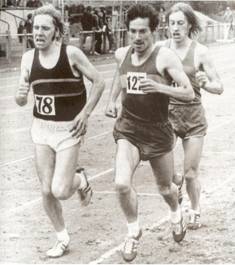
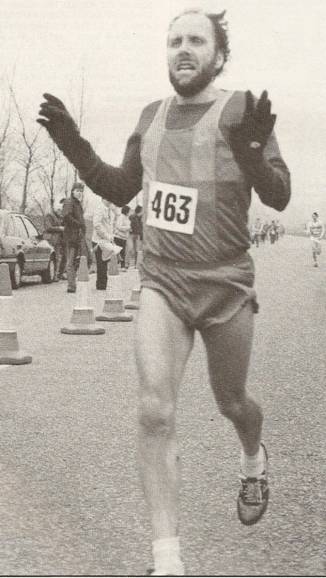
![image003[1]](http://www.scottishdistancerunninghistory.scot/wp-content/uploads/2015/09/image0031.jpg)
